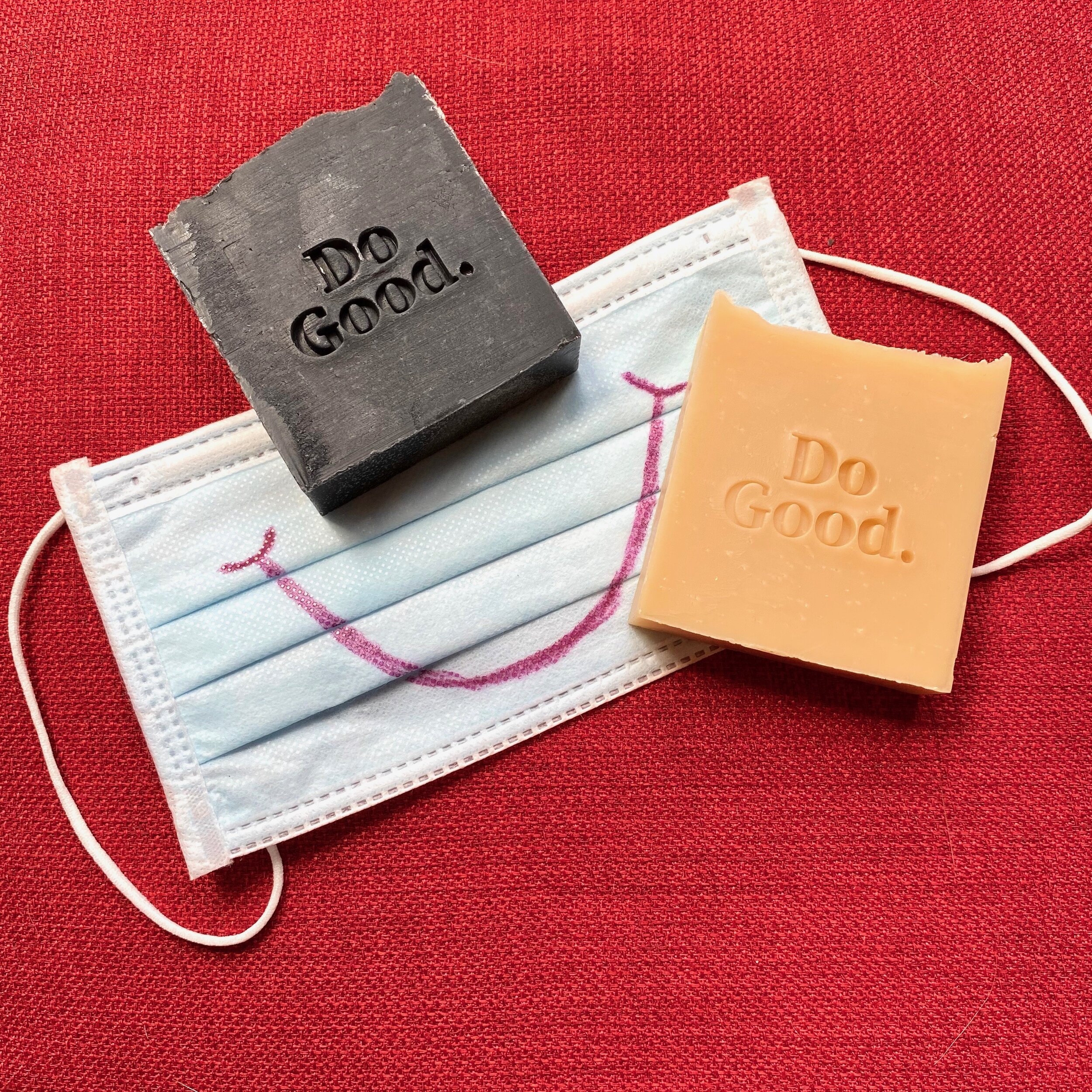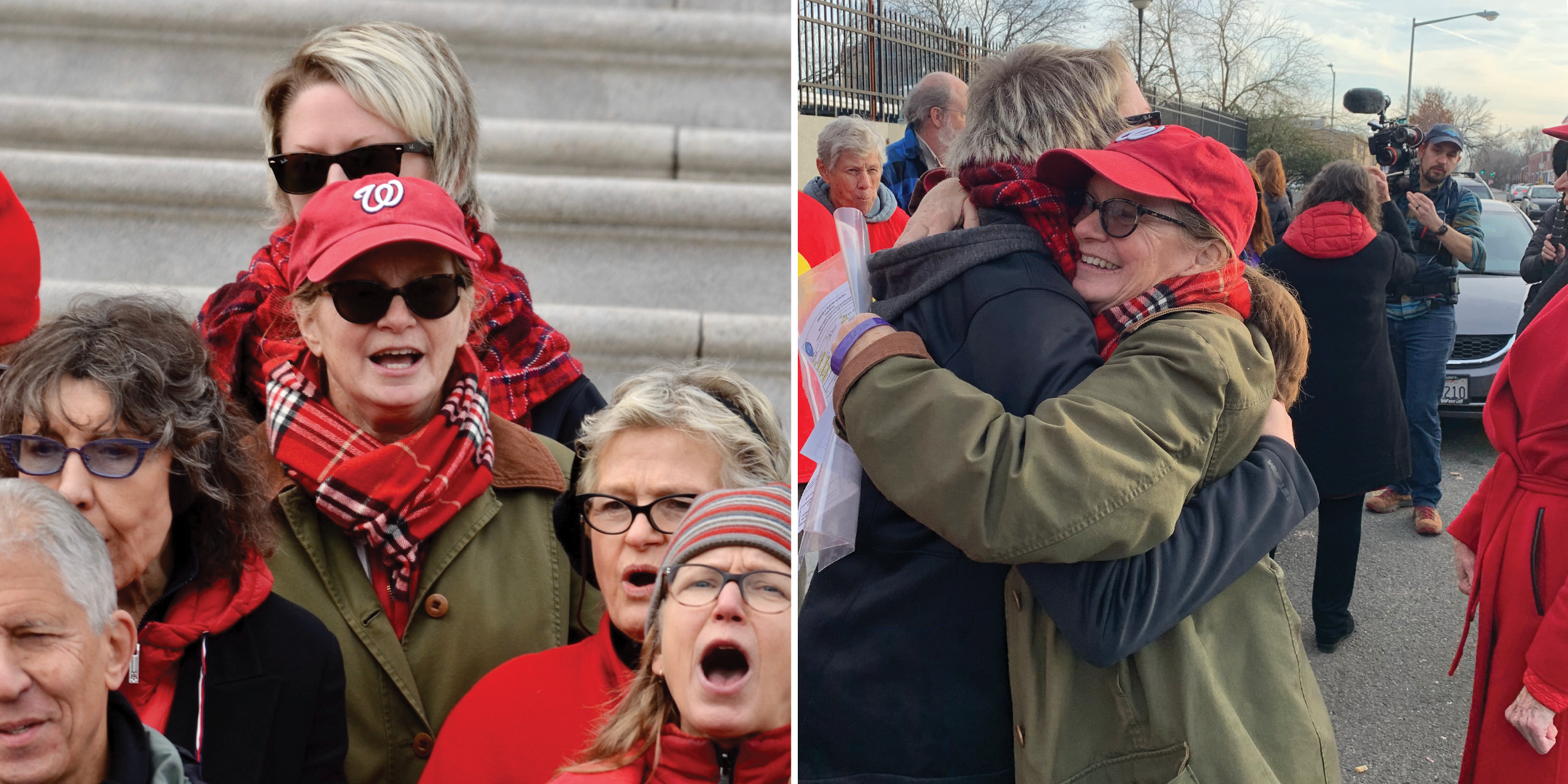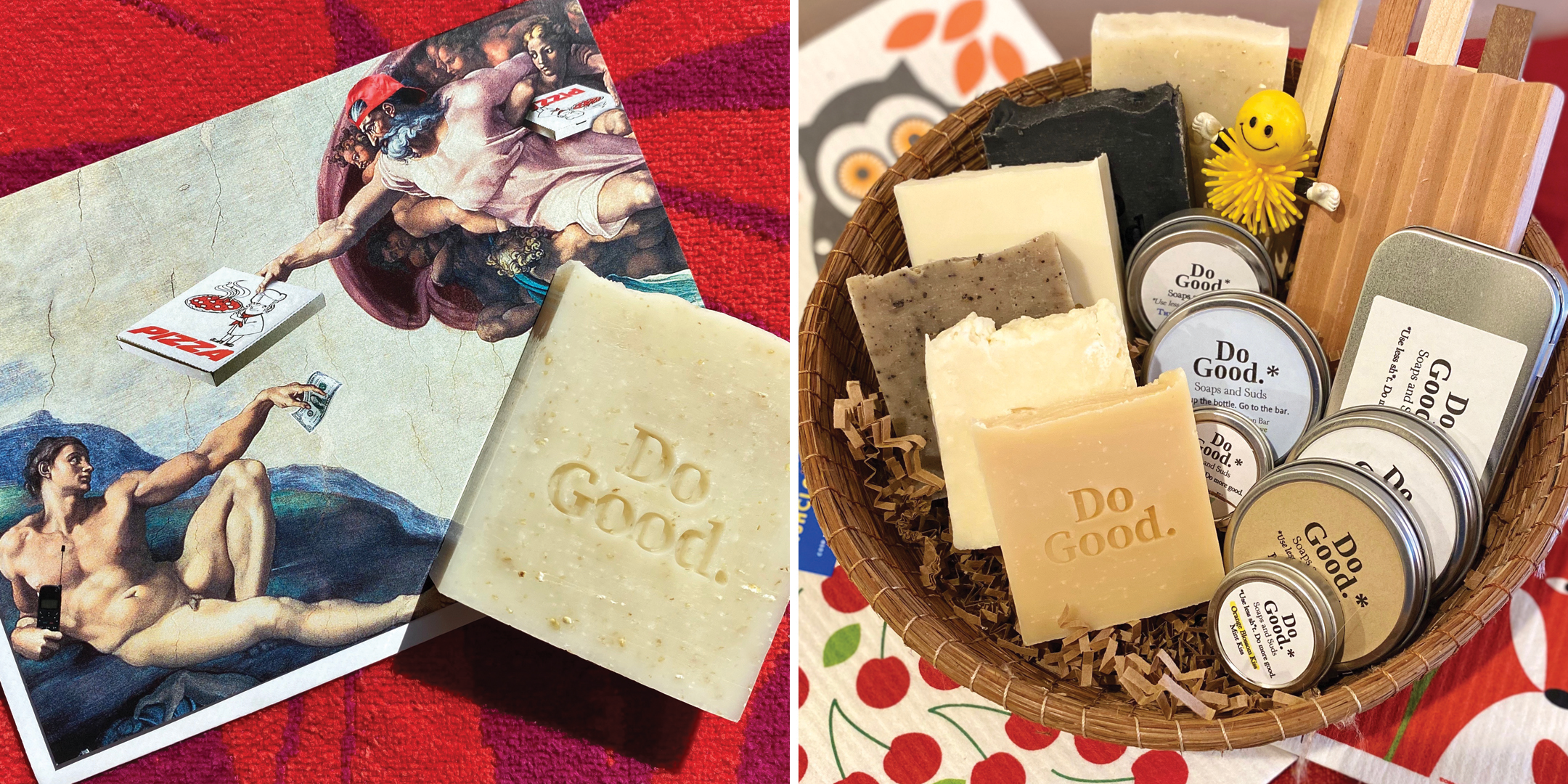Lee Ann Hopkins Does Good
Do Good Soaps and Suds is a gateway to a reduced-waste, sustainable life.
Every morning, as I step into the shower and lather up with my Bonaparte soap bar, I silently thank Washington, D.C.’s Capitol Police. I don’t remember the specific officer who directed me to sit next to Lee Ann Hopkins for the five hours we spent in police custody, but that seemingly random seat assignment continues to pay off in myriad lovely and unexpected ways.
Last November, I went to D.C. on a whim to attend a rally with Fire Drill Fridays, the Jane Fonda-led climate justice movement (now affiliated with Greenpeace). I hadn’t intended to get arrested, but I was so moved by the speakers and energy of the crowd that I found myself in handcuffs for the first time in my life. Capitol Police confiscated my sign urging people to “Destroy the Patriarchy Not the Planet,” but they unintentionally gave me something much more valuable in return: an introduction to the community of activists I had been seeking.
We—30+ women, including Fonda, and a handful of men—sat in police custody without phones or other distractions, and while I don’t recall the specifics, I can be sure that Hopkins introduced herself to me first. Hopkins, who was seated to my left, was born in Kansas and is Midwestern hospitality personified. By the time we were released, I walked out with a freshly-minted police record, a thumb covered in black ink, and a new life-long friend.
After I returned to New York, Hopkins and I reconnected via Instagram, where I discovered that she was the founder of Do Good Soap and Suds, a company committed to providing plastic-free shampoo bars, lotions, soaps, lip balms, and other personal care products. Inspired by her mission to “Use less sh*t. Do more good,” I gifted her soap to everyone I knew for the holidays. When the (repurposed) box arrived, it smelled so good that I was tempted to keep it all for myself.
Recently, Hopkins sent me my very own Bonaparte bar and I was hooked. In addition to looking super cool, the black soap—made with a blend of clove, eucalyptus, lemon, and activated charcoal—smells incredible. According to Hopkins, the Bonaparte “includes the essential oils used by both Napoleon's merchants in the 1800's and those impacted by the plague of the 1400's. The unique combination of essential oils was a lifesaver for those who interacted with the many, many people that died during these times, especially the gravediggers and the grave robbers.” At a time when hand washing is not only a courteous choice but one crucial to our very survival, Hopkins’ eco-conscious soap company feels more relevant than ever.
Hopkins and her cat, Neige.
Hopkins says her path to climate activism was neither immediate nor linear, but rather “a slow and steady process.” She was born in suburban Kansas; when her family moved to a farm, her father taught her the importance of water and soil in cultivating crops and sustaining animals. “Dad instilled in me this sense of land and being proud of the land and working the land, and taking good care of the land,” Hopkins says. “The land was really, really important to me.”
Growing up in the Midwest in the early 1960s, Hopkins says that plastic was nowhere near as prevalent—or, in some circles, as reviled—as it is today. When The Graduate was released in 1967, the popular film featured this eerily prescient exchange between Walter Brooke and Dustin Hoffman:
Mr. McGuire: I want to say one word to you. Just one word.
Benjamin: Yes, sir.
Mr. McGuire: Are you listening?
Benjamin: Yes, I am.
Mr. McGuire: Plastics.
Benjamin: Exactly how do you mean?
Mr. McGuire: There's a great future in plastics. Think about it. Will you think about it?
Unfortunately, people did more than think about it: since 1950, plastic production has grown by 8.6% per year, with more than 9 billion metric tons of plastics spread around the world. It’s estimated that only about “9% of that has been recycled, 12% has been incinerated (polluting the air with toxic gases), and the remaining 79%, remains in the environment.”
Mr. McGuire was right; our future was, and is, in plastics—but not always for the better. According to Greenpeace, “If current production and waste management trends continue, by 2050, there will be 12 billion tons of plastic in natural environments.” Hopkins, who uses a medical device made out of plastic, concedes that “plastic has been an incredible gift to some of us. I would really like it if there was something else beside plastic that could keep me alive—it’s been both a gift and a curse.”
Hopkins at the Capitol on December 27, 2019 with Lily Tomlin.
Since 1940, Kansas has given its electoral votes to a Democrat only once (to Lyndon B. Johnson in 1964), and growing up, Hopkins was the membership chair for the young Republicans. Now, she says, “I’m so far left I’m almost not a Democrat.” She credits storytellers for helping her make the transition to embracing progressive politics. “Just because you grew up with a certain story doesn’t mean you can’t change the story,” Hopkins says. “Change can happen. There is hope.”
In October of 2018, however, Hopkins was anything but hopeful. She was working in D.C. as an attorney near the Trump International Hotel. She would sit outside on her lunch break and look across Pennsylvania Avenue, dreaming of a creative outlet to buck her depression. “I started baking,” Hopkins says. “I started making art, then I made some soap. I’m a DIY person, but I also like to be practical and use whatever I make.”
As she enjoyed the fruits of her labor, she suspected others might too—and sensed an opportunity to also reduce her reliance on single-use plastics. “One day I was in the bathroom looking at my shampoo bottles and thought ‘Do I really need all this shit?’”
The first Do Good products were solid soap and shampoo bars, “because that’s really all we need,” Hopkins says. Her mission to “rid the world of plastic” started in the bathroom but has since taken over every level of the Alexandria, Virginia townhouse she shares with her wife, Andrea, their greyhound Enzo, and their cat, Neige. Hopkins experiments with new recipes in the couple’s kitchen; the products are moved to another level while they cure, and the basement is reserved for storage. Hopkins would love to banish plastic from her home altogether, but acknowledges that it’s not always possible, especially in the midst of a global pandemic.
“My vision for Do Good six months ago was very different than it is now,” Hopkins says. “So many doors have been slammed shut. It’s hard to think about the future when the basics of today are hard to get through, but I still dream of changing the ways people view plastic. I want to help people live a life that isn’t harming the planet, but the pandemic means more plastic in our lives—gloves and face masks—and no farmers markets, pop-ups, or retail spaces. It’s not just about selling my products, it’s about teaching people how they can be zero waste or reduced waste in their own lives.”
Me lurking behind Hopkins and hugging her as she was released from detention (while Fonda looks on).
Before she was an attorney “working for the Man,” Hopkins was enrolled in seminary. Her feminist approach to theology may have seemed radical, but she never strayed far from her roots. “I brought that Kansas girl who loved the Earth, the soil and the water to my theological training,” she says. She was paying attention to the changing climate, but it wasn’t until she saw Al Gore’s 2006 documentary, An Inconvenient Truth, that her beliefs began to gel.
“An Inconvenient Truth turned me upside down.” Hopkins says. “It was at that point that I really started thinking about how I live in the world.” She began to ride her bike more, but it would be several more years before she began to take action. Even then, she started small. “I did small things, I picked up litter, I do Earth Day every year—I’d recommit every year thinking, ‘Oh I’m going to do something big,’ but I didn't, not really.”
She had consistently donated money to environmental organizations, but eventually, the bad news—especially about plastic—became impossible to ignore. “If I had to see one more turtle wrapped around some sort of plastic that was left in the ocean or any other gross thing that was happening to ocean animals, I was going to lose my fucking mind,” Hopkins says.
It was around this time that Hopkins was also becoming disillusioned with her career as an attorney. “I was unhappy,” she says. “I didn’t want to be working for a large law firm but I wondered ‘What can I do?’”
Fonda’s four-month stint in Washington, D.C.—beginning in October of 2019—with Fire Drill Fridays came at the perfect time for Hopkins. She had just left her job at the law firm, a decision that opened the door for her to participate in civil disobedience. “Once I stopped working as an attorney, I knew I could get arrested and so that was the thing for me,” Hopkins says. “I have always done civil disobedience—before I was an attorney—so I was like yeah, let’s go! I wanted to do civil disobedience and who was doing it? Jane Fonda.”
Hopkins felt as transformed by her first arrest with Fire Drill Fridays as I did. She attended every subsequent rally—missing only two because of a birthday trip to Costa Rica—and was arrested a total of three times. “Fire Drill Fridays has a very special place in my heart,” Hopkins says. “It was the community I'd been looking for. Women and the youth are leading this next wave of activism—it was 90% women each time I was arrested—and it’s time for women to take the lead. They’re all my eco-warrior sisters.”
Hopkins acknowledges that the fight for climate justice is far from new, and cites the indigenous and frontline communities that have been advocating these same issues for decades or even longer. But she says that the uptick in activism, especially since 2016, is palpable. “It would be so white of me to think that this started in October of 2019,” Hopkins says. “It didn’t start then—it’s been ongoing for a long, long, long time. But I think in 2019—with Greta Thunberg and the young people and then Jane Fonda—things have ratcheted up quite a bit.”
Help clean up the planet one soap, one lotion, one balm, one bar at a time.
When asked about their motivations, activists often cite their concern for future generations. I made the decision to not have my own children long before I began learning about the dire climate projections, and every new grim report only serves to solidify my decision. But even if I don’t intend to procreate, I still worry about the world I will leave behind—and selfishly, the one I hope to enjoy for as long as possible while I’m still here. During my last arrest with Fire Drill Fridays in January, someone asked Martin Sheen about what motivated his impressive record of civil disobedience arrests. “You have to keep ego out of it,” Sheen said. “You do it for yourself, to know that you’ve done all you can.”
Hopkins, who doesn’t have children of her own, says that of course she’s concerned about the world she will leave for her nieces and nephews, but admits that her activism mostly comes from a “selfish” place.
“The experiences I had as a child in Kansas—the flora, the fauna, the bees—I have a memory of all that richness and what scares me is how much other generations haven’t seen,” she says. “We’re losing so much biodiversity and I am terrified by all this extreme weather. Honestly I'm doing it for me because ten years—that’s all we’ve got. It’s like trying to turn around the Titanic. I’m terrified for myself. I don’t know what life will be like. But that’s why we plant trees, not so much so we can enjoy them—we’re planting them for the future.”
The issues threatening our collective future may be far from new, but the roadblocks to progress are ever-evolving. In the wake of COVID-19, activists are scrambling to maintain momentum while the usual tricks—protests, mass gatherings, civil disobedience, etc.—are increasingly unsafe or prohibited altogether. While we’re (rightly) focused on keeping each other safe and healthy, we do ourselves a disservice if we don’t at least try to seize the opportunities of these overlapping crises—and acknowledge that this pandemic is, in no way, an isolated event. The people involved with the climate change movement have already turned a critical eye toward the future—and what they see is terrifying.
“Climate activists are not necessarily surprised by this,” Hopkins says. “They’re the canary in the coal mine, saying ‘Hey there’s trouble ahead and we gotta do x, y, and z.’”
Hopkins is cautiously optimistic that radical, system-wide change is possible, not in spite of, but perhaps because of this unique moment in history. “These kinds of moments don’t happen that often,” she says. “During WWII we came together to fight a common enemy, but we’re so divided now. There’s so much mistrust, democracy is crumbling all around us, and without that sort of cradle—that foundation—I’m terribly worried. This is the time for great change to happen, but I’m struggling as an activist—is what I’m doing enough?”
For the foreseeable future, Fire Drill Fridays has pivoted from in-person rallies to virtual ones, and Fonda has offered myriad ways for members to stay motivated and productive even while we stay in our homes. Hopkins continues to seek solace and transformation through storytellers and cites novels, nonfiction books, and movies as sources of constant inspiration.
“The first step for anything is always education,” she says. “Education is the springboard. I had to get it in my head first. Then I got in my heart. It’s the longest 12 inches in the world from your head to your heart, but I had to do it in my head first. Once I got it there, it was an easy sell to my heart.”
BOOKS:
Silent Spring, by Rachel Carson
The Uninhabitable Earth: Life After Warming , by David Wallace-Well
The End of Nature, by Bill McKibben
Falter: Has the Human Game Begun to Play Itself Out?, by Bill McKibben
This Changes Everything: Capitalism vs. the Climate, by Naomi Klein
On Fire: The Burning Case for a Green New Deal, by Naomi Klein
The Unsettling of America: Culture and Agriculture, by Wendell Berry
MOVIES:
An Inconvenient Truth
An Inconvenient Sequel: Truth to Power
The Lorax
The Story of Stuff
LINKS:
Do Good Soaps and Suds | Fire Drill Fridays | Greenpeace











